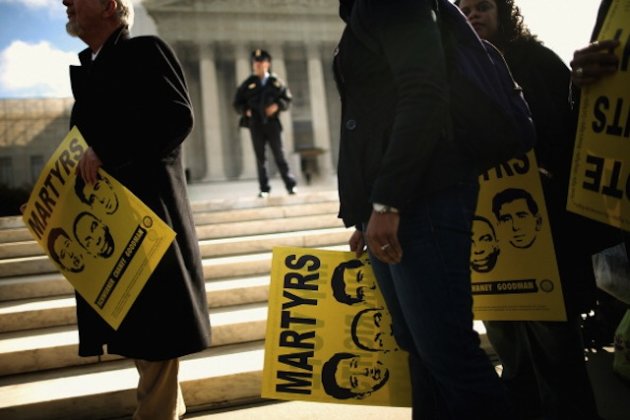 Holding signs with images of murdered Mississippi civil rights workers, demonstrators rally in front of the U.S.??
Holding signs with images of murdered Mississippi civil rights workers, demonstrators rally in front of the U.S.??
The Supreme Court struck down a key part of the Voting Rights Act Tuesday, a cornerstone of the civil rights movement that helped dismantle decades of discriminatory voting restrictions in the South when it passed 60 years ago. The vote was 5-4, with the court's liberal justices dissenting.
The decision drastically scales back the federal government's power to reject state laws it believes discriminate against minority voters, which include some efforts to tighten identification requirements and limit early voting hours at the ballot box. A wave of such laws swept 30 states over the past few years, and the Obama administration has aggressively fought them in court.
Section 5 of the Voting Rights Act, reauthorized by Congress for another 25 years in 2006, gives the federal government the ability to pre-emptively reject changes to election law in states and counties that have a history of discriminating against minority voters. The law covers nine states and portions of seven more, most of them in the South. The formula used to decide which states are subject to this special scrutiny (set out in Section 4 of the law) is based on decades-old voter turnout and registration data, the justices ruled, which is unfair to the states covered under it. States that had a discriminatory poll test in the 1960s and low turnout among minority voters must seek special permission from the federal government to change their election laws, even though many of these states now have near equal voter turnout rates between minorities and whites.
"The coverage formula that Congress reauthorized in 2006 ignores these developments, keeping the focus on decades-old data relevant to decades-old problems," the justices wrote. "Our country has changed, and while any racial discrimination in voting is too much, Congress must ensure that the legislation it passes to remedy that problem speaks to current conditions."
The Justice Department used Section 5 of the law to block voter ID laws in Texas and South Carolina last year, and it also struck down early voting restrictions in five counties in Florida. (Minority voters are more likely than white voters to vote early in person, and are less likely than whites to have a government-issued photo ID.) Some Democrats argued that these laws were intentionally trying to suppress minority turnout in order to benefit Republicans.
The court has effectively now put the ball back in Congress' court, writing in their decision that is up to them to write a new formula that is based on current data. It seems unlikely that Congress, which is now more partisanly divided than in 2006, would tackle the challenge of creating a new rubric to find and eradicate racial discrimination at the polls, however.
Court watchers predicted the decision, given the conservative justices' comments on the law during oral arguments and in other cases. Justices in the conservative wing of the Supreme Court, including Chief Justice John Roberts, expressed reservations that the nine Southern states covered by the law still required the same degree of federal oversight that they did 60 years ago. "Voter turnout and registration rates [between blacks and whites] now approach parity," Roberts wrote in a decision in 2009. "Blatantly discriminatory evasions of federal decrees are rare. And minority candidates hold office at unprecedented levels."
Another argument against Section 4's constitutionality was that it's unclear whether minority voters in Southern states are more likely to face discrimination at the polls than they are in other states. Voter ID laws, for example, have passed in states such as Wisconsin, Pennsylvania and Indiana. Because those states do not have a history of voter discrimination?and are not covered by the act?their voter ID laws did not have to first pass federal inspection. That said, Southern states covered under the act were much more likely to pass a voter ID law than other states. Seven of the nine states covered in full under the act adopted such a law, compared with 19 states overall.
Source: http://news.yahoo.com/blogs/news/supreme-court-strikes-down-key-part-voting-rights-141205218.html
corned beef recipe rpi dst friends with kids pacific standard time northern mariana islands summer time
No comments:
Post a Comment
Note: Only a member of this blog may post a comment.